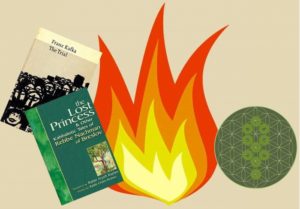Lee Henderson, award-winning author of The Broken Record Technique, The Man Game, and The Road Narrows As You Go, is seeing big changes this year due to the pandemic. And like everyone else, he’s having to take things online, which he’s doing this weekend.
Henderson, who is also an associate writing instructor at the University of Victoria, is presenting a Zoom lecture on Sunday, November 15 titled “Kafka, Nachman, Kabbalah and Neuroses.”

There are definite pros to the many cons of “the new normal,” but the positive ramifications of the COVID-19 crisis can be easy to lose sight of in these unsettling times. Henderson keeps the positives in mind; take Zoom, for example.
“[Zoom] give writing students who may have otherwise chosen different universities a chance,” says Henderson.
Despite that the pandemic has closed many doors, Henderson finds that others have opened. He says that teaching creative writing to 150-person classes, as well as directing select MFA program students, is fun.
“This year, it’s all on Zoom,” says Henderson. “We’ve got students who are connecting from Moscow. Somewhere in Brazil, and somewhere in Mexico, and in Toronto, of course. It’s really cool.”
Henderson was a young child when he wrote his first story. He recounts the storytellers that made an impression on him as a youth, when authors the likes of Lorna Crozier, Patrick Lane, and Sean Virgo gave readings for his high-school English class. Today, he knows what some of those writers know: that some stories take longer than others to write.
“I have stories that I’ve been working on for six years,” says Henderson, “I can never predict how long a piece is going to take.”
As for his talk this weekend, Henderson is no stranger to Kafka: Henderson’s 2006 Journey Prize-winning short story “Conjugation” was inspired by Kafka’s “The Metamorphosis.” Kafka’s A Hunger Artist makes a series of predictions, Henderson says, such as that the 20th century will find people fascinated with performance art and art that’s on the body, as well as the idea of how we use our bodies for art and how we use the space for art as a relational space with the audience that requires a kind of interaction.
“The hunger artist seems to, like a prophet, predict this movement of intentional suffering as a representation of a social suffering,” says Henderson.
Sunday’s Zoom talk will focus on Kafka’s shorter works.
“‘Before the Law’ and ‘An Imperial Message’ are little, super-succinct summaries of the themes throughout [Kafka’s] The Trial or The Castle,” says Henderson. “Endless searching for an answer to a call that’s been given that is ambiguous, and, who sent the call?”
Kafka’s stories connect to the Hasidic tradition of tales, fables, and parables, says Henderson; storyteller Rabbi Nachman (who died in 1810) and Kafka, strangely, have much in common.
“[Nachman] came from a pious tradition… his great-grandfather was the Baal Shem Tov, legendary founder of the Hasidic movement,” says Henderson.
He says that Hasidic storytelling is comparable to Grimm’s fairy tales with “a different resolution… and a real different purpose.” Nachman, Henderson says, seems to be “imitating a secular style of bedtime story in order to secretly tell really powerful theological messages.”
“That’s why I’m going to talk about both of them,” he says, “[because] Kafka’s work is in some ways a really fascinating exegesis on Jewish Biblical tradition.”
Henderson says that he is simply approaching this lecture as someone who loves these writers and is excited to get a chance to talk about them.
“I don’t feel like I have grappled with Kafka nearly as well as some academics, you know? I’m still just a fan who reads his work when I can,” says Henderson.
Kafka, Nachman, Kabbalah and Neuroses by Lee Henderson
7 pm Sunday, November 15
Free
Zoom link: uvic.zoom.us/j/86253595456
